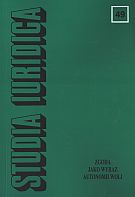W KWESTII ZGODY WSPÓŁUPRAWNIONYCH NA PRZENIESIENIE UDZIAŁU WE WSPÓLNOŚCI WYNALAZCZEJ – UWAGI DE LEGE LATA I DE LEGE FERENDA
ON THE QUESTION OF THE CONSENT OF CO-OWNERS OF THE INVENTION FOR THE ASSIGNMENT OF A SHARE IN THE INVENTORS’ CO-OWNERSHIP – OBSERVATIONS DE LEGE LATA
Author(s): Łukasz ŻelechowskiSubject(s): Law, Constitution, Jurisprudence
Published by: Wydawnictwa Uniwersytetu Warszawskiego
Keywords: wspólność wynalazcza; wspólności wynalazczej; prawo; law; Polish law; prawo własności; przeniesienie udziału; patent law; prawo wynalazcze; OWNERSHIP
Summary/Abstract: The assignment of a share in the inventors’ co-ownership is not regulated by the provisions of the Industrial Property Act of 30th June 2000. In this case art. 198 of the Civil Code is respectively applicable. It stipulates that each co-owner of a material thing may freely dispose of his share without the consent of remaining co-owners. In that regard two questions arise: firstly, whether Art. 198 of the Civil Code is fully applicable to the assignment of a share in the co-ownership of the invention or whether its application should be limited or even excluded; secondly, what model regulation would provide an optimal solution to the problem of the assignment of the share in the co-ownership of the invention. Two considerations must be taken into account, when answering the above questions. On one hand there is a need of securing the freedom of each co-owner to assign his share. On the other hand there is a need to protect the remaining co-owners against an uncontrolled purchase of a share by an undesired person e.g. by a competitor of the co-owners in the market. The conclusion is that de lege lata it is not possible to assume any limitations of the assignability of a share or a part of a share in the co-ownership of the invention. This position is justified by the interpretation of the respective provisions of law, also employing historic, comparative and systematic methods of interpretation. The current legal position can hardly be considered as satisfying, for it grants no protection of remaining co-owners. The article contains a brief summary of conceivable solutions to this problem. The most appropriate proposal seems to be the reinstatement of the formerly existing requirement of the consent of remaining co-owners for an assignment of a share. If the remaining co-owners refuse to give their consent for no reasons, merely in order to discriminate the seller, the appropriate protective measure could be the possibility to apply to the court, which could than allow for the assignment. This proposal is based on the legislation already in force pertaining to the assignment of a share in the limited liability company.
Journal: Studia Iuridica
- Issue Year: 2008
- Issue No: 49
- Page Range: 275-291
- Page Count: 17
- Language: Polish

